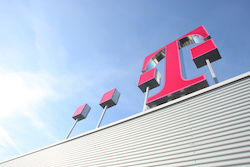Deutsche Telekom said today it has stolen a march on rival Vodafone by launching the first live narrowband IoT (NB-IoT) networks anywhere in the world.
The Germany-based operator has launched the technology in it home market and the Netherlands, initially for application developers to trial their solutions on commercial networks. It will continue to upgrade its LTE network to enable NB-IoT connectivity, it said.
Vodafone, which has led development of the technology from the start, said yesterday it would debut the technology in commercial networks in Germany, Ireland, the Netherlands and Spain in the first three months of 2017.
NB-IoT, which will provide LTE-based connectivity for low-power wide-area networks, was Vodafone’s idea in the first place, and it has championed the technology through its development and standardisation in the 3GPP, chairing the GSMA’s NB-IoT Forum in the process.
The UK-based operator completed the first over-the-air connection on a live network using standardised NB-IoT in Madrid, Spain, last month, in collaboration with Huawei, its long-time partner on development of the technology. It has also been upgrading its network in Valencia to accommodate the NB-IoT trial work it has had with Spanish water utility Aguas de Valencia.
Vodafone has also busily promoted the technology, as well as its leadership of it, to raise support for it among chipset and module makers, and the industry at large.
But Deutsche Telekom, also in collaboration with Huawei, has been running it close in recent months, and said today its first commercial NB-IoT networks went live a fortnight ago, at least two months ahead of Vodafone’s schedule.
Deutsche Telekom suggested it had been busy implementing the technology, while Vodafone had been busy talking it up.
“There are two types of companies – the ones that announce and the ones that create, lead and innovate. Earlier this year Vodafone announced that it will have the world’s first NB-IoT ready network up and running by November 2016, after we had some strong messages ourselves at MWC,” said a Deutsche Telekom spokesperson.
“Today we see they will not be the world’s first. We are. Our system went live two weeks ago and we will continue to roll out the technology now – and not somewhere in the near future. Our partners are already testing their systems and solutions using our network.”
The spokesperson added: “We have seen that many of them are on the way to finalise their solutions, but they need to test them first – not in the lab but under real conditions. That’s why we put the pedal to the metal and support our partners.”
Vodafone refused to get involved. But Luke Ibbetson, its Director of Research and Development, told Mobile Europe earlier this month Vodafone’s chief objective is to drive the broader NB-IoT ecosystem.
“We have, as a community of operators, great and rapidly growing customer demand across a large number of segments on one side, and a technology that works, and gives us deep indoor and underground coverage, on the other,” said Ibbetson.
Deutsche Telekom said its upgrades represented the “world’s first NB-IoT end-to-end system”. It is using single radio access network (SRAN) base stations, virtualised core network (C-SGN) and a cloud-based IoT platform, it said.
Its first NB-IoT application, which sees sensors installed in parking bays communicate with a motorists via a smartphone app, is up and running in Bonn, in Germany.
The company is using its ‘Prototyping Hub’ in Bonn, and its hub:raum facilities in Berlin and Krakow, to work with developers and customers to produce new NB-IoT applications.
As well, it has established a new NB-IoT ‘Soft Lab’ initiative, which plays on the idea of the Open Lab concept. Instead of physical labs, Deutsche Telekom’s Soft Labs will allow developers from anywhere in the world to collaborate on NB-IoT solutions via software running on a standard PC.
Bruno Jacobfeuerborn, Chief Technology Officer at Deutsche Telekom, said: “We have achieved an important milestone on the road to a full, Europe-wide commercial roll-out of NB-IoT based solutions.”
Jiang Wangcheng, President of Global IoT Business at Huawei, said: “Together with Deutsche Telekom, we are front runners in accelerating the NB-IoT ecosystem and making this technology a commercial success.”
Meanwhile, Vodafone announced today a roaming deal with Inmarsat, with the ambition to enable international satellite and cellular roaming connectivity for the IoT applications. It said “satellite-powered IoT” allows organisations to extend their services beyond terrestrial networks, where they have remote connectivity requirements, for example in the agri-tech, utilities, oil and gas and transportation sectors.
Ivo Rook, Director of IoT, at Vodafone said: “Success in IoT demands a mix of different technologies for different applications. By adding satellite connectivity from Inmarsat to the Vodafone portfolio we continue to deliver on our strategy to lead in managed IoT services.”




